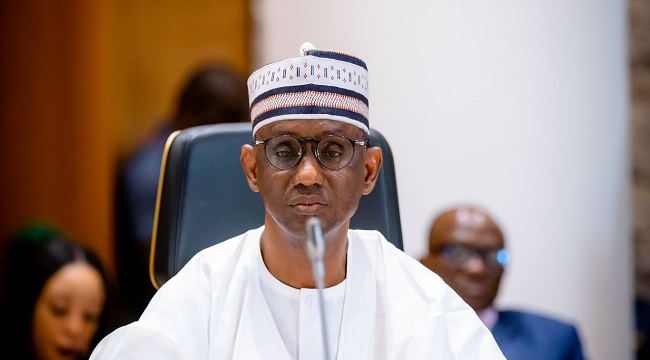…Most airports facilities lack Access to modern security technologies – NAMA
The National Security Adviser (NSA), Mallam Nuhu Ribadu, has directed the immediate implementation of a one-stop joint-interest screening system of passengers across Nigerian airports.
The directive is part of efforts to eliminate operational clumsiness, curb touting, and streamline security innovations in the aviation sector.
Also, the Nigerian Airspace Management Agency (NAMA) has disclosed that many airports and airspace facilities have yet to benefit from modern security technologies.
These were disclosed at an aviation security symposium themed: ‘The Fundamentality of Security in Achieving the Safe Skies Goals,’ organised by the Nigerian Civil Aviation Authority (NCAA).
The NSA noted that aviation security must evolve to meet emerging threats and emphasised a coordinated national approach.
The NSA, who was represented by a member of the National Counter Terrorism Centre (NCTC), Air Commodore Ahmad Madawaki, further stated that the Office of the National Security Adviser (ONSA) is developing a security track assessment framework to monitor and evaluate all airports and airspace operations in Nigeria.
“The Nigerian government, especially the Office of the National Security Adviser, is concerned about the security of our airspace and airports. The mandate of the Office is to coordinate the operations of relevant security agencies to ensure that the operations of the aviation sector are protected from acts of unlawful interference.
“Security agencies are also required to collaborate and cooperate with all operators to ensure their duties are carried out most efficiently and professionally. As part of the efforts of the Office of the National Security Adviser, the NSA has directed the implementation of the one-stop joint-interest screening system to avoid clumsiness and touting innovation operations at our airports.”
“The National Security Adviser’s office is also developing a security track assessment framework to monitor and evaluate all airports and airspace operations in Nigeria. This initiative involves a multi-stakeholder setup, drawing expertise from various sectors to assess risks and bolster nationwide aviation safety.
“The framework will guide assessments and help ensure that operators across the industry are security-conscious. Stakeholders must share timely information to safeguard both our airports and the airspace,” the NSA stressed.
He reiterated that aviation security is a shared responsibility, urging all players in the aviation ecosystem to align with global standards of vigilance, safety, and operational excellence.
“The beauty of ensuring safer skies lies in our collective action. The challenges of insecurity are no longer isolated to any region. We must treat our airspace as a critical national asset and protect it accordingly,” he said.
He also called for sustained collaboration among security agencies and aviation stakeholders, underlining that the ONSA’s mandate is to coordinate all security operations seamlessly and professionally.
“This symposium is a timely reminder that aviation security must be treated with the seriousness it deserves. It’s not just about protecting air routes but also our national integrity,” he concluded.
Meanwhile, NAMA said obsolete screening systems, inadequate perimeter fencing, poor surveillance coverage and limited access control systems expose key installations to avoidable threats.
He added that the integration of physical and cyber-security systems remains suboptimal, limiting the ability to detect, deter, and respond to security breaches in real time.
The managing director of NAMA, Farouk Umar Ahmed, said there is a lack of synergy among security agencies. Despite the shared responsibility for securing aviation infrastructure, coordination among security agencies remains weak.
Ahmed said the absence of structured inter-agency communication channels, overlapping mandates, and fragmented incident response mechanisms continue to compromise the effectiveness of security operations at airports.
“This lack of synergy delays critical decision-making and hinders unified responses to security threats,” he added.
Ahmed, who was represented by Rita Egbadon, director of Legal Services, said the critical role of aviation security personnel is undermined by insufficient training, poor remuneration, and limited opportunities for career development.
“Several frontline officers are not conversant with evolving international security standards, while low morale continues to affect performance, vigilance, and professionalism.
“A growing concern is the deployment of inadequately qualified individuals into sensitive aviation security positions. These appointments often bypass necessary screening, certification, and background verification processes required by ICAO Annex 17 and national civil aviation regulations. The result is a vulnerability in the leadership and execution of security protocols at airports and related facilities,” he explained.
He suggested that there is a need to put in place a joint aviation security task force and create a National Aviation Security Coordination Framework, anchored by the Federal Airports Authority of Nigeria (FAAN) and regularly inspected or audited by NCAA, to drive seamless collaboration among all security stakeholders.
This task force, he suggested, should convene regularly to share intelligence, develop joint action plans, conduct simulations, and issue coordinated advisories.
He also spoke on the need to prioritise investment in security infrastructure and federal and state authorities, in partnership with the private sector, must invest in modern aviation security equipment.
These, he said, include biometric access systems, smart surveillance solutions, integrated command centres, and advanced threat detection tools.
“Funding mechanisms should be developed to ensure sustained upgrades and maintenance. Adopt a Comprehensive Capacity-Building and Incentive Program. The security personnel should undergo recurrent training accredited by ICAO and relevant bodies.
“Training must cover not only physical security but also cyber security, behavioural detection, and emergency response Additionally, structured motivation frameworks- including health benefits, hazard allowances, and career progression plans-should be introduced to retain top talent,” Ahmed explained.






































Discussion about this post